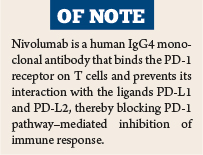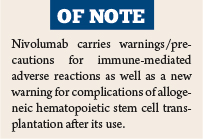In the Clinic provides overviews of novel oncology agents, addressing indications, mechanisms, administration recommendations, safety profiles, and other essential information needed for the appropriate clinical use of these drugs.
On May 17, 2016, nivolumab (Opdivo) was granted accelerated approval for treatment of patients with classical Hodgkin lymphoma that has relapsed or progressed after autologous hematopoietic stem cell transplantation and post-transplantation brentuximab vedotin (Adcetris).1,2 Continued approval for the classical Hodgkin lymphoma indication may be contingent upon the verification of clinical benefit in a randomized phase III trial.
Supporting Efficacy Data
Approval was based on the objective response rate among 95 patients previously treated with autologous hematopoietic stem cell transplantation and post-transplantation brentuximab vedotin in two single-arm multicenter trials.2 The response rate was determined by an independent radiographic review committee. Patients had a median of five prior systemic regimens (range = 3–15). Treatment consisted of 3 mg/kg via intravenous infusion over 60 minutes every 2 weeks until disease progression, maximal clinical benefit, or unacceptable toxicity. Patients received a median of 17 doses of nivolumab (range = 3–48).

The response rate was 65% (95% confidence interval = 55%–75%), including partial remission in 58% and complete remission in 7%. The median time to response was 2.1 months (range = 0.7–5.7 months). Estimated median duration of response was 8.7 months.
How It Works
Nivolumab is a human immunoglobulin G4 (IgG4) monoclonal antibody that binds the PD-1 (programmed cell death protein 1) receptor on T cells and prevents its interaction with the ligands PD-L1 and PD-L2, thereby blocking PD-1 pathway–mediated inhibition of immune response, including antitumor immune response. Binding of PD-L1 and PD-L2 to the PD-1 receptor inhibits T-cell proliferation and cytokine production. Upregulation of PD-1 ligands occurs in some tumors, and signaling through this pathway can contribute to the inhibition of active T-cell tumor immune surveillance. In syngeneic mouse tumor models, blocking PD-1 activity resulted in decreased tumor growth.
How It Is Used
The recommended dose of nivolumab in classical Hodgkin lymphoma is 3 mg/kg via intravenous infusion over 60 minutes every 2 weeks until disease progression or unacceptable toxicity.
In patients receiving nivolumab for classical Hodgkin lymphoma, treatment should be withheld for grade 2 pneumonitis, grade 2 or 3 diarrhea or colitis, alanine transaminase (ALT) or aspartate transaminase (AST) levels > 3 to 5 times the upper limit of normal or total bilirubin > 1.5 to 3 times the upper limit of normal, serum creatinine > 1.5 to 6 times the upper limit of normal, grade 2 or 3 hypophysitis, grade 2 adrenal insufficiency, grade 3 hyperglycemia, grade 3 rash, new-onset moderate or severe neurologic signs or symptoms (potential immune-related encephalitis), and first occurrence of other grade 3 adverse reactions. There are no recommended dose modifications for hypothyroidism or hyperthyroidism.
Accelerated Approval of Nivolumab in Classical Hodgkin Lymphoma
- Nivolumab (Opdivo) was granted accelerated approval for treatment of patients with classical Hodgkin lymphoma that has relapsed or progressed after autologous hematopoietic stem cell transplantation and post-transplantation brentuximab vedotin.
- The recommended dose of nivolumab in classical Hodgkin lymphoma is 3 mg/kg via intravenous infusion over 60 minutes every 2 weeks.
Nivolumab should be permanently discontinued for grade 4 diarrhea or colitis, grade 4 hypophysitis, grade 3 or 4 adrenal insufficiency, grade 4 hyperglycemia, grade 4 rash, grade 3 or 4 pneumonitis, AST or ALT levels > 5 times the upper limit of normal or total bilirubin > 3 times the upper limit of normal, serum creatinine > 6 times the upper limit of normal, immune-mediated encephalitis, recurrence of grade 3 adverse reaction, life-threatening or grade 4 adverse reaction, requirement of ≥ 10 mg/d of prednisone or equivalent for > 12 weeks, and persistent grade 2 or 3 adverse reactions lasting at least 12 weeks.
Infusion should be interrupted or slowed in patients with mild or moderate infusion reactions. Nivolumab should be discontinued for severe or life-threatening infusion reactions.
Safety Profile
Safety was evaluated in 263 patients with relapsed or refractory classical Hodgkin lymphoma, of whom 98% had received autologous hematopoietic stem cell transplantation. Patients received a median of 10 doses at the approved dose.
The most common adverse events of any grade were fatigue (32%), upper respiratory tract infection (28%), pyrexia (24%), diarrhea (23%), and cough (22%). The most common grade 3 or 4 adverse events were pneumonia (3.0%) and rash (1.5%). Other common adverse events of any grade reported in at least 10% of patients included rash, pruritus, musculoskeletal pain, nausea, vomiting, abdominal pain, headache, peripheral neuropathy, arthralgia, dyspnea, infusion-related reactions, and hypothyroidism or thyroiditis. Other immune-mediated adverse events occurring in 1% to 5% of patients included rash, pneumonitis, hepatitis, hyperthyroidism, and colitis. The most common grade 3 or 4 lab abnormalities were increased lipase (6.5%) and neutropenia (3.6%).

A new warning/precaution was issued for complications of allogeneic hematopoietic stem cell transplantation after nivolumab. Transplant-related deaths have occurred, and health-care professionals should follow patients closely for early evidence of transplant-related complications, such as hyperacute graft-vs-host disease (GVHD), severe acute GVHD, steroid-requiring febrile syndrome, hepatic veno-occlusive disease, and other immune-mediated adverse reactions. The U.S. Food and Drug Administration has required the manufacturer to further study the safety of allogeneic hematopoietic stem cell transplantation after nivolumab.
In addition, nivolumab carries warnings/precautions for immune-mediated adverse reactions, including immune-mediated pneumonitis, colitis, hepatitis, endocrinopathies, nephritis and renal dysfunction, rash, encephalitis, infusion reactions, and embryofetal toxicity. Patients should be monitored for changes in liver, kidney, thyroid, and neurologic function and for hyperglycemia. Breastfeeding women should discontinue breastfeeding while receiving nivolumab. ■
References
1. U.S. Food and Drug Administration: Nivolumab (Opdivo) for Hodgkin lymphoma. Available at http://www.fda.gov/Drugs/InformationOnDrugs/ApprovedDrugs/ucm501412.htm. Accessed May 26, 2016.
2. Opdivo (nivolumab) injection for intravenous use prescribing information, Bristol-Myers Squibb Company, May 2016. Available at http://www.accessdata.fda.gov/drugsatfda_docs/label/2016/125554s019lbl.pdf. Accessed May 26, 2016.

